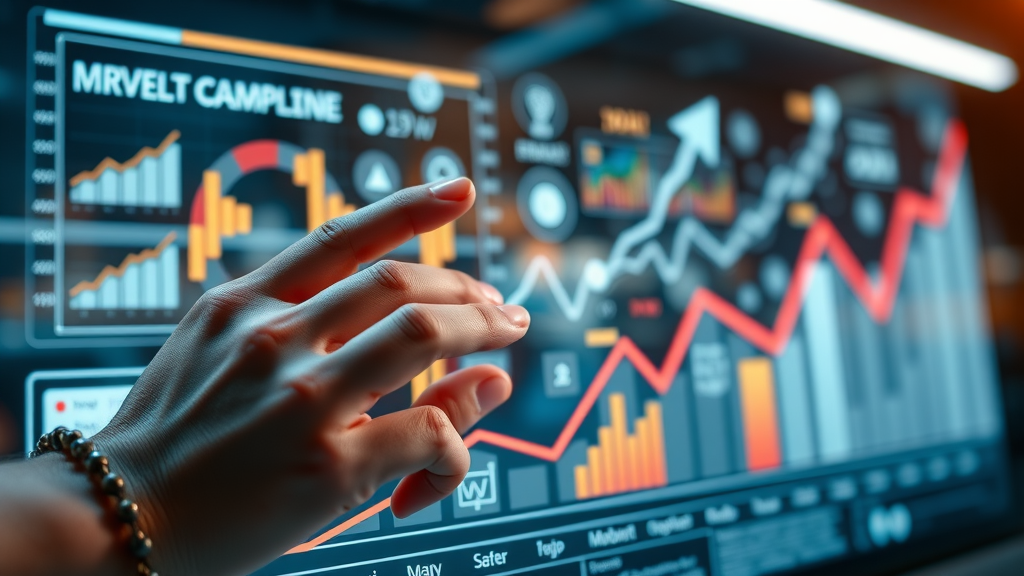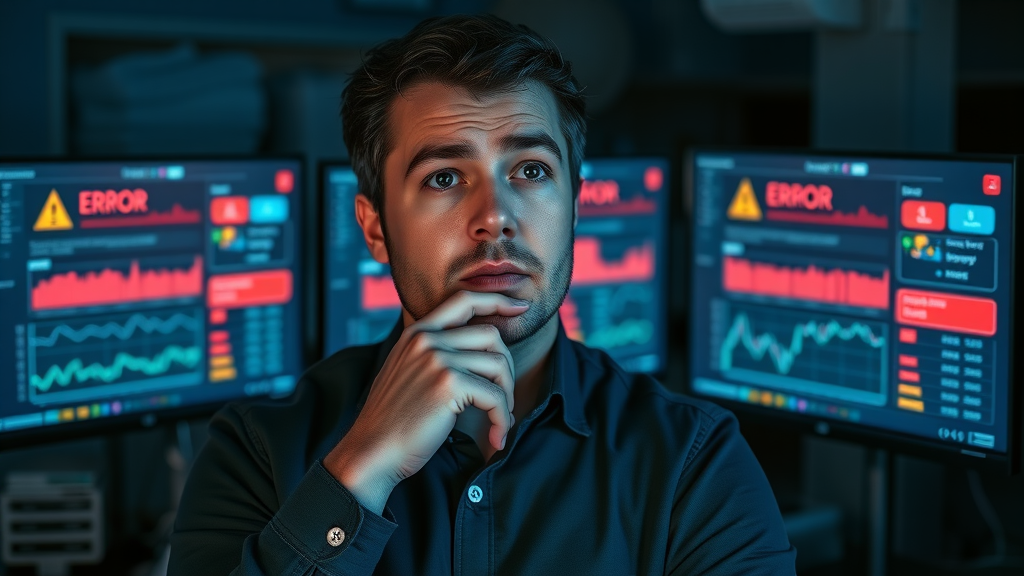Did you know that over 85% of consumers interact with brands through digital channels before making a purchase? In an era where your business’s digital presence can make or break success, unlocking the secrets of digital media marketing isn’t just optional—it’s essential for survival and growth. Whether you’re a startup, an established brand, or looking to propel your marketing career, this guide delivers powerful, actionable strategies and surprising insights that will redefine how you approach digital media marketing.

Unlocking Digital Media Marketing: Surprising Statistics & Strategic Insights
Why Digital Media Marketing Is Transforming the Business Landscape
- Over 85% of consumers engage with brands via digital channels before making a purchase decision.
- Major businesses leverage digital marketing —from innovative content creation to data-driven ad campaigns—for remarkable, measurable growth in brand awareness and sales.
- Trends like AI integration, hyper-targeted advertising, and mobile-first content are rapidly evolving, forcing brands in 2024 to adapt their digital media marketing strategies faster than ever.
Digital media marketing isn’t just a trend—it's a fundamental shift that is transforming the way businesses connect with potential customers and build long-lasting relationships. With the introduction of advanced analytics, automation technologies, and real-time engagement tools, companies now have unprecedented capabilities to reach audiences where they are most active: online. Strategies based on recent search engine optimization (SEO) trends and audience data provide higher returns on investment than traditional marketing channels, while also helping brands nurture loyalty and trust. For brands aiming to lead their industries, mastering digital media channels like social media and targeted content is no longer a nice-to-have—it’s a must.
In 2024, digital marketing’s impact is clear: over 85% of all purchase decisions start online, with consumers consuming branded content before they ever reach out to a product or service provider. This shift demands a sophisticated, multi-channel approach that blends paid, owned, and earned media across platforms such as social media, search engines, and mobile devices. The fast pace of digital trends—think AI-powered chatbots, voice search, and immersive video ads—means that staying ahead requires continuous learning and adaptation from digital marketers at every level.

Empowering Success: What You’ll Gain from Mastering Digital Media Marketing
- Clarity on the core components and types of digital media marketing
- Actionable, data-driven digital marketing strategies for 2024
- Best practices for leveraging social media, SEO, and email marketing to reach and engage potential customers
- Tips for creating brand awareness and measuring digital campaign ROI with real-world metrics
Mastering digital media marketing empowers you to build lasting brand awareness, drive targeted traffic, and generate measurable results while aligning your business goals with the ever-changing online landscape . By understanding the essential pillars of digital marketing—ranging from compelling content creation to nuanced social media and email strategies—you develop the tools needed to attract and retain loyal audiences, no matter your industry. Learning to use the latest digital platforms and analytics will make your marketing campaigns more effective and efficient, maximizing every dollar for the biggest impact.
This guide arms you with actionable insights to run campaigns that outperform the competition. From using advanced segmentation in email marketing to embracing influencer and affiliate marketing, the tips you’ll learn will set you apart as a savvy digital marketer. By mastering these proven tactics, you can stay ahead of fast-moving trends—like mobile marketing and AI-driven personalization—and ensure your digital marketing strategy consistently delivers ROI in a crowded digital ecosystem.
The Pillars of Digital Media Marketing: Types, Channels & Foundations
Decoding Digital Marketing: The Four Essential Types
- Search Engine Optimization (SEO): Optimal use of keywords and technical strategies to rank high in search engines, driving organic traffic to your site.
- Content Marketing: Crafting valuable blog posts, videos, infographics, and more to attract, inform, and convert your audience.
- Social Media Marketing: Engaging with potential customers where they spend most of their online time—on major platforms like Instagram, Facebook, and TikTok.
- Pay-Per-Click Advertising (PPC): Placing targeted ads on search engines and social media to generate immediate, measurable results.
"To ignore digital media marketing today is like opening a business but not telling anyone."

Exploring the Five Core Types of Digital Media
| Type | Description | Primary Platforms |
|---|---|---|
| Owned Media | Digital assets you control | Website, blogs, social pages |
| Paid Media | Advertising paid for exposure | Google Ads, sponsored posts |
| Earned Media | Publicity gained organically | Reviews, shares, mentions |
| Shared Media | Content co-created or shared between brands and users | Social media collaborations |
| Hybrid Media | Mix of above types | Affiliate/influencer campaigns |
The Top 7 Digital Marketing Approaches Explained
- SEO (Search Engine Optimization)
- Content Marketing
- Social Media Marketing
- Email Marketing
- Affiliate Marketing
- Influencer Marketing
- Mobile Marketing
Effective digital media marketing blends a mix of these core approaches, adapting them to the specific needs of your products and services. Social media marketing, in particular, allows for rapid amplification of brand messages, while content marketing forms the backbone of SEO-driven authority and trust. Mobile marketing is now critical; with most users browsing on mobile devices, strategies must focus on mobile-first campaigns, SMS promotions, and mobile app engagement.

Crafting a Winning Digital Media Marketing Strategy for 2024
Setting Clear Goals: The Foundation of Every Digital Marketing Plan
- Building a comprehensive digital marketing strategy with measurable outcomes.
- Defining SMART objectives for media marketing campaigns.
Every successful digital marketer starts with clear, measurable goals. SMART (Specific, Measurable, Achievable, Relevant, Time-bound) objectives keep your digital marketing strategy on track and ensure every action supports your brand’s growth. By defining tangible outcomes—such as increasing website traffic by 25% within six months —you guide your marketing campaigns to deliver concrete results. The ability to adapt quickly, analyze data, and adjust goals is also essential, especially with the dynamic nature of digital platforms and consumer expectations in 2024.
Whether you focus on boosting brand awareness, driving conversions, or nurturing post-purchase loyalty, your digital marketing campaign should be guided by well-defined key performance indicators (KPIs). Regularly reviewing these KPIs and using real-time analytics will let you make data-driven decisions and refine your marketing strategies for optimal impact.

Content Creation & Content Marketing: Fueling Digital Engagement
- The art and science of content creation tailored for digital media
- How to align your content marketing with evolving search engine algorithms
- Best content formats for driving social media marketing success
At the core of digital marketing is content creation . Developing high-quality, targeted content ensures you consistently engage audiences across multiple media channels. Blogs, videos, podcasts, and interactive infographics not only attract organic traffic through search engines but also reinforce your brand authority and trustworthiness. Smart content marketers know the value of aligning their output with current search engine optimization guidelines—this could involve leveraging trending keywords, optimizing meta descriptions, and delivering content in preferred formats for mobile consumption.
As search engine algorithms evolve, so should your content marketing strategies. Current best practices emphasize creating value-rich, shareable material that draws in social media engagement, encourages backlinks, and stimulates conversation. For amplified brand awareness and reach, adapt content to each platform while keeping messaging consistent. In 2024, short-form video, live experiences, and user-generated content have emerged as top content formats for social media marketing success, giving audiences multiple ways to interact with your brand and become loyal advocates.
Leveraging Social Media for Exceptional Brand Awareness
- Which platforms are best for your digital media marketing?
- Trends in social content creation and audience engagement
- Building sustainable brand awareness via social networks
Social media channels have become the epicenter of online marketing and digital media strategies. Today’s digital marketers must choose the platforms that best match their brand’s voice and target demographic: Instagram, TikTok, LinkedIn, and Facebook all offer unique opportunities for storytelling, influencer collaborations, and direct customer interaction. Major trends such as ephemeral content (stories), Reels, and platform-based live streaming have changed how brands engage with current and potential customers.
To gain sustainable brand awareness, your social media marketing should focus on community-building, timely interactions, and value-first communications. This means leveraging trending hashtags, initiating interactive polls, and investing in platform-specific advertising to meet audiences where they naturally spend their time online. The most successful campaigns combine authentic content with data-driven analysis, ensuring each post or story contributes to both engagement and long-term business goals.

Search Engine Optimization in Digital Media Marketing Strategies
- Current SEO tactics and emerging trends
- Integrating search engine optimization with content and social media marketing
Search engine optimization (SEO) remains vital to digital marketing success. As algorithms become more sophisticated, the focus has shifted to user experience, technical SEO, and rich content that addresses both intent and relevance. The 2024 trends include voice search optimization, featured snippets, and deeper integration of AI in ranking signals. By adopting robust keyword research processes, creating content clusters, and earning quality backlinks, digital marketers can dramatically improve their online visibility.
Successful digital media marketing campaigns seamlessly incorporate SEO into every phase of content marketing and social outreach. Optimize headlines, structure website navigation for usability, and enhance mobile site speed to support both SEO and user engagement. More than ever, integrating search engine data with social media insights helps you create data-driven campaigns that drive brand awareness and customer loyalty across all digital platforms.

Proven Channel Mastery: Email, Affiliate, Influencer & Mobile Marketing Tactics
Email Marketing Campaigns that Convert in Modern Digital Media
- Nurturing leads with personalized email marketing
- Automations and intelligent list segmentation to increase ROI
Email marketing continues to deliver a strong ROI when personalized and segmented effectively. Automating emails based on customer behavior—such as abandoned cart reminders or personalized offers—can nurture leads through the sales funnel. Today’s best practices include dynamic content, triggered workflows, and integrating email activities with other digital marketing channels for a cohesive customer journey. By segmenting email lists according to demographics or actions, you maximize relevance and boost engagement rates in every campaign.
The rise of mobile devices means all email marketing assets must be optimized for smartphones and tablets. Smart marketers leverage A/B testing and real-time analytics to refine messaging, sending schedules, and offers, ensuring each campaign delivers tangible return on investment and supports overarching digital marketing strategy objectives.
Unlocking Affiliate and Influencer Marketing for Digital Success
- Forming high-impact partnerships
- Leveraging micro and macro influencers effectively
- Tracking affiliate marketing campaign performance
Affiliate marketing and influencer marketing are now staples of high-performing digital media marketing strategies. By partnering with individuals and brands whose audiences overlap with your own, you expand your reach while maintaining high trust and engagement levels. Micro-influencers, with niche loyal followings, and macro-influencers, with wide-reaching presence, each bring distinct benefits. The key is authentic collaboration—selecting partners who genuinely align with your values and objectives.
Track campaign performance using unique referral links and advanced analytics platforms. Monitor conversions, engagement, and retention generated through affiliate marketing and influencer collaborations, adjusting strategies based on data for improved campaign results. This approach elevates your media marketing and positions your brand as an industry leader while driving both awareness and direct sales.

The Rise of Mobile Marketing in Digital Media Landscapes
- Mobile-first strategy essentials
- Harnessing SMS, push notifications, and mobile-optimized content
With more than half of all internet traffic originating from mobile devices, mobile marketing is now a cornerstone of every digital marketing strategy. Essential components include responsive website design, apps that provide frictionless user experiences, and content adjusted for quick mobile consumption. SMS marketing and push notifications offer real-time engagement opportunities, allowing you to deliver tailored messages at precisely the right moments for maximum impact.
Marketers should leverage location-based targeting, personalized offers, and immersive in-app content to capture attention. Equally important is optimizing landing pages for speed and visual clarity on mobile devices. By making mobile marketing a priority, digital marketers ensure campaigns are reaching audiences wherever they are—at work, on the go, or at home—future-proofing their digital media initiatives for ongoing growth.

Analytics, Measurement, and the Digital Marketer’s Toolbox
Data-Driven Digital Media Marketing: Tracking KPIs & Metrics
- Identifying the metrics that matter: from website traffic to engagement and conversion rates
- Using analytics to optimize ongoing media marketing campaigns
A successful digital marketing campaign is built on accurate data. Digital marketers track Key Performance Indicators (KPIs) such as website visitors, bounce rates, click-through rates, conversion rates, and average order value to gauge campaign effectiveness. Monitoring these data points enables real-time optimization—refining ad spend, adjusting messaging, or reallocating resources to the channels that generate the highest ROI.
Advanced analytics platforms provide deep insights, allowing you to visualize customer journeys and fine-tune marketing strategies accordingly. The ability to interpret and act on this data separates top-performing digital marketers from the rest, ensuring each campaign incrementally improves and drives sustainable growth in brand awareness and revenue.

Recommended Tools for the Modern Digital Marketer
- Top tools for campaign management, analytics, and content scheduling: HubSpot, Google Analytics, SEMrush, Buffer, Hootsuite
- Free vs. premium: What digital marketers need in 2024—start with Google’s free suite, then add advanced platforms as your campaigns grow in complexity
The right digital marketing tools make campaign management efficient and results-driven. Platforms like HubSpot unify CRM, email, and content creation; Google Analytics tracks and visualizes performance; SEMrush and Ahrefs power competitive research and SEO optimization; while Buffer and Hootsuite handle social media scheduling and monitoring. Free tools like Google Analytics and the basic versions of many platforms are excellent for new marketers or small businesses, while robust, premium tools offer automation and data depth crucial for scaling businesses and ambitious digital media campaigns.
"If you can’t measure it, you can’t improve it in digital media marketing."
Turning Knowledge into Action: Building Your Digital Media Marketing Roadmap
Real-World Success Stories in Digital Media Marketing
- Test case summaries from leading brands that tripled website visits through multichannel marketing.
- Success story #1: A direct-to-consumer beauty brand achieved a 200% ROI increase by integrating influencer partnerships with targeted, retargeted display ad and email marketing campaigns.
- Success story #2: A SaaS provider utilized mobile marketing and content marketing in tandem, yielding dramatic growth in user adoption and brand awareness within six months.
Top digital marketers share a critical trait: agility in combining data insights with creative strategies. These real-world examples showcase how leveraging influencer marketing, mobile-first design, and a strong SEO-content-social synergy leads to rapid, measurable growth. Their winning marketing campaigns demonstrate that, when executed with focus, digital media marketing moves the revenue and reputation needle—fast.
Checklist: Steps to Launch Your Next Digital Marketing Campaign
- Audit your current digital presence—review website, social media, and analytics performance.
- Identify the right mix of media marketing channels for your goals, audience, and industry.
- Develop compelling content for each stage of the funnel, from brand introduction to conversion.
- Optimize continuously based on analytics—measure, test, and refine for better ROI.
Implementing this checklist will make your campaigns more targeted, data-driven, and successful. Be prepared to adapt as insights surface, ensuring every marketing tactic aligns with your overall digital marketing strategy and delivers sustainable, cumulative impact.
Common Digital Media Marketing Mistakes & How to Avoid Them
- Ignoring data insights and feedback from analytics tools.
- Underestimating the importance of consistent, targeted content creation—and failing to adapt to changing trends.
- Neglecting newer channels like mobile and influencer marketing, missing opportunities to meet audiences where they are.
Many campaigns fail for simple reasons: lack of measurement, disregard for data, and outdated methods. To become a successful digital marketer, continually monitor metrics, embrace new technologies and trends, and focus on relevant, audience-driven content across all digital media. This approach minimizes risk and ensures your brand remains agile and competitive in a crowded marketplace.

People Also Ask About Digital Media Marketing
What are the 4 types of digital marketing?
- The four core types include Search Engine Optimization (SEO) , Content Marketing , Social Media Marketing , and Pay-Per-Click (PPC) . These pillars work synergistically within a complete digital media marketing strategy.
What are the 5 types of digital media?
- Digital media types are Owned Media , Paid Media , Earned Media , Shared Media , and Hybrid Media —all crucial for building a seamless digital marketing presence.
What are the top 7 types of digital marketing?
- The top 7 types are SEO , Content Marketing , Social Media Marketing , Email Marketing , Affiliate Marketing , Influencer Marketing , and Mobile Marketing , each addressing unique aspects of media marketing for comprehensive results.
Is digital media marketing a good career?
- Yes, digital media marketing is a vibrant and growing field with expansive opportunities, competitive compensation, and the ability to work across diverse industries or as an independent digital marketer.
Frequently Asked Questions (FAQs) on Digital Media Marketing
- How does content marketing support search engine optimization? Content marketing delivers valuable, keyword-rich content that attracts and engages audiences. Search engines prioritize sites with fresh, quality material—meaning robust content creation directly boosts SEO, resulting in higher search engine rankings and increased organic traffic.
- What’s the difference between digital marketing and online marketing? The terms are often used interchangeably, but digital marketing is broader—it includes all electronic channels (web, social media, email, SMS, mobile apps, even digital billboards), whereas online marketing refers specifically to tactics that need internet connectivity.
- How often should you analyze your digital marketing strategy? Review your strategy at least monthly, but monitor core metrics (traffic, engagement, conversions) weekly. This allows digital marketers to adapt campaigns quickly and stay aligned with emerging platform trends or changes in consumer behavior.
- What are the best free tools for digital marketers? Google Analytics, Google Search Console, Buffer, Canva, and Keyword Planner are excellent free tools. They help in monitoring analytics, managing content creation, scheduling posts, and refining SEO for effective digital media marketing.
- How long does it take to see results from a digital media marketing campaign? Results timelines vary by channel—PPC and social ads can show outcomes within days, while SEO and content marketing may take 3-6 months for significant change. Consistent effort and optimization accelerate success for all types of digital campaigns.
Key Insights from Top Digital Marketers
"Digital media marketing isn't about being everywhere—it’s about being everywhere that matters to your audience."
Achieve Exceptional Growth with Expert Digital Media Marketing Support
- Ready to level up your digital marketing strategy? Call Digital Media Marketing at 586-997-0001 for a personalized consultation and take your brand to the next level.
 Add Row
Add Row  Add
Add 




Write A Comment